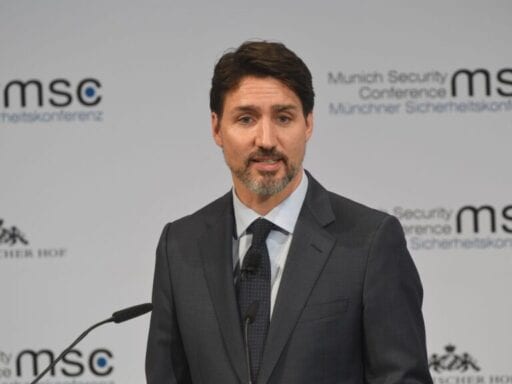Canadian citizens, legal permanent residents, and US citizens (for now) are exempt.
Canada is closing its borders to most noncitizens, as the country tries to contain the spread of the novel coronavirus.
Prime Minister Justin Trudeau announced Monday that all people except Canadian citizens, legal permanent residents, and US citizens would be denied entry. Exemptions also exist for diplomats, airline crews, and immediate family members of Canadian citizens.
Canada is taking this measure to try to slow the spread of the virus. Right now, Canada has about 375 confirmed cases. That’s far fewer than the other top global economies in the Group of Seven (G7), but the virus is spreading to different provinces, and government officials and health leaders are trying to curb that.
“We can still slow the spread of this virus,” Trudeau said Monday. “It is time to take every precaution to keep people safe.”
The measures will go into effect on Wednesday, March 18.
The exemption for US citizens, Trudeau said, was made because of the deep integration between the two neighbors, which requires close coordination during a public health emergency like this one. But he added that that could change. “Everything is on the table to protect Canadians,” he said.
Trudeau said only four airports would accept international flights, and that anyone trying to come to Canada who is showing symptoms would not be allowed to board a plane.
He also urged Canadians traveling overseas to come back home, saying the government would help provide financial assistance, as needed. The Canadian government has already asked anyone returning from abroad to self-isolate for 14 days, according to the CBC.
Trudeau urged Canadians to stay home when possible, but said the decision to close the borders came from public health officials who felt that this, in conjunction with social distancing measures, would slow the spread of the coronavirus.
Both Ontario and Alberta have shut schools, and other provinces are beginning to take precautions as the virus spreads. Trudeau himself is in isolation after his wife, Sophie, tested positive for the coronavirus.
Canada’s announcement came as other countries announced restrictions. The United States is extending its European travel ban to include the United Kingdom and Ireland, effective Monday. Experts have said such travel restrictions would do little to stop the slow of the coronavirus within the US — that will require ramping up testing and social distancing — but more and more countries are expanding or adopting travel restrictions. Many of these are now targeting places like the United States and Europe, where the number of cases continues to grow.
The European Union has called for a 30-day ban on all foreigners entering the bloc. South American countries such as Argentina and Peru have closed their borders. Many African countries, including Ghana and Kenya, have also introduced restrictions on visitors from places with coronavirus cases. As the virus spreads across borders, countries are doing whatever possible to slow its arrival and transmission.
Author: Jen Kirby
Read More



